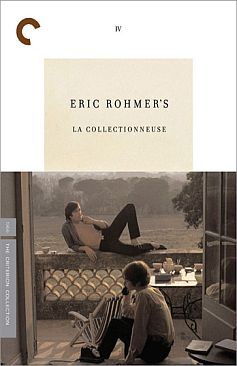La Collectioneuse (1967)
By Chris Middlehurst
Published on October 5, 2016

Eric Rohmer is, like Godard, Truffaut, Melville, Chabrol, Resnais, Rivette and Marker, considered one of the great French filmmakers of the New Wave that began writing ferocious reviews of films for the magazine Cahiers du Cinema.
Legend goes that when they were put to the test to make films themselves, these writers rolled up their sleeves, traded pens and typewriters for cameras and tripods, and rode fearlessly into the world of film-making. Some perhaps fared better than others, but all ultimately succeeded in one way or another in transferring their passion for cinema from the magazine to the big screen. Of all, Godard was probably the most daring, Truffaut the most accessible, but Rohmer was undoubtedly the most boring.
His films essentially revolve around the stench of the idle rich: it’s a pity that Rohmer forgets all too often to flush. His characters indulge themselves in abstract conversations about morality and ethics that are so flat and lacking in emotion that they seem like cardboard cut-outs of snotty professors reading out loud the weekly newsletters of suburban parishes. I learned recently that, like his Cahiers du Cinema contemporaries, Rohmer was an ardent Hitchcock fan and wrote many glowing reviews of his films in the post-war pre-1960s heyday of French film criticism. (Exciting time, right!) I suppose that Rohmer is like Hitchcock in the sense that both are obsessed with the precise development of situations on film through cutting and camera movements. The difference between them is that Hitchcock seeks to entertain, and Rohmer seeks to cure insomnia. Hitchcock himself had a much quicker solution to that problem which came in capsule form. It was a bullet.
More blatant than Hitchcock is the structuring of his films like a novel, each scenes intercut with titles marked “Prologue,” “Chapter,” “Epilogue.” You cannot imagine how much I was looking forward to “The End,” but of course had I known that I had to sit through two hours of fart-inducing moral conundrum dribble in the first place, I probably would have taken my chances and pressed the “fast-forward” switch on the remote. The plot, if there is one, concerns a set of young adults who are all fascinated by the beautiful and apparently elusive Haydee, who “spins” them in a psychological mind game that evokes more Graham Norton than Hannibal Lector.
La Collectioneuse is crystal celluloid proof that simply staging beautiful people in beautiful surroundings does not guarantee a good film. Rohmer’s camera movements are sparse, his editing controlled and patient: every shot fits perfectly into place and his film moves along like a well-oiled machine. Pity this machine moves at about the pace of a snail in a hurry, mind. Whilst Rohmer is without doubt an excellent craftsman in the camera and editing departments, his strengths lie not in scriptwriting, and too often do his characters seem to be reciting long, tedious monologues that, no, wouldn’t sound good on paper, either.
If you like collecting priceless Ming dynasty vases, driving fast cars, slouching in wicker armchairs all day in your holiday home in the south of France whilst throwing rocks at chickens, then La Collectioneuse is probably for you.
The Author

Chris Middlehurst is The New Jurist film review editor. Chris graduated from Leeds University with a BA in English Literature, where he served as President of the LUU Film Making Society and also took elective modules in Chinese, Italian and World Cinema. He currently lives in Leeds and volunteers regulary at the wonderful Hyde Park Picture House, where he urges film lovers to visit if they get the chance!
Article picture: Wikipedia.


